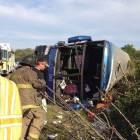
Sep 24, 2014
One thing that I have realized over my years in EMS is that the concept of a “typical day” is a foreign one. There is something that we can pinpoint from just about every single shift that made that shift a unique one. Sometimes it is a bizarre patient, or maybe a complicated medical call. Other times, it is a major incident that gets your system talking for weeks and months to come.
Earlier this week, my department had one of those calls that would occupy the last segment of shows like Emergency!, Third Watch, or Chicago Fire. It was intense, with close to forty patients on scene. While the call took a bit longer than the fifteen minutes that it would have on TV, it was well run, went smoothly, and for the most part was wrapped up in less than an hour. The remarkable thing to me though is what happened after the call.
There were no high fives from anyone. There was no freeze frame of a group of paramedics with credits rolling over them. Everything returned to normal much like it was an hour before the incident happened. After that last patient was loaded into the back of the ambulance, everyones focus turned towards gathering up their remaining equipment, loading it back into their units, and going back in service.
When major incidents happen, that does not mean that everything else going on within the system stops. When the towers fell on September 11, 2001, people in New York City were still getting shot. They were still having heart attacks. When my staff and I were making our way through downtown Springfield after the tornado hit looking for patients, there were still psych calls and people with abdominal pains who had not even realized what happened in their own back yard. And when we were tending to our forty patients, there were still calls going on in our coverage area. A little more than an hour after our incident started, it was over. My partner and I cleared up, and on our way back to the station, we listened to three more calls get dispatched that were your just run of the mill everyday emergencies, just like they were earlier that day, as if nothing had happened.
While these television dramas over the years like ER, Third Watch, Emergency! or Chicago Fire show us the exciting high paced moments that our field might experience, I wanted to take this opportunity to applaud every EMT and paramedic out there who runs those “routine” calls while the system is taxed by something major. They are the unsung heroes. They are the ones who keep things going, commonly turning over calls at twice the pace because of the depletion of the system.
So stand up and take a bow. Just because you were not on “the big one” that does not mean that you did not play a major part in a not so typical day.
